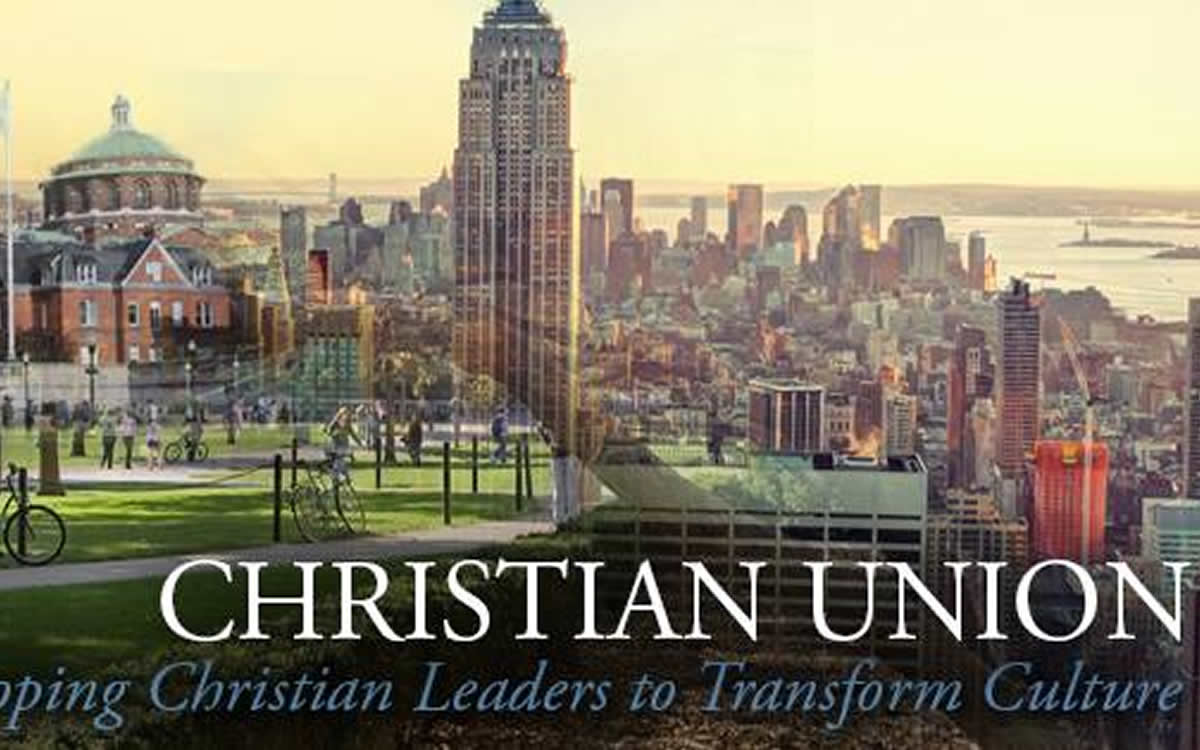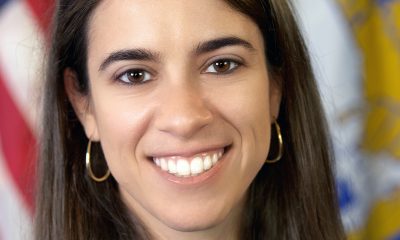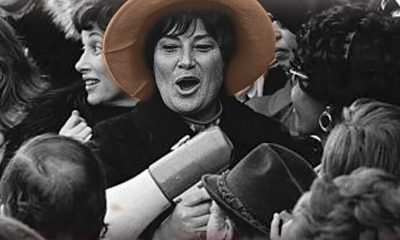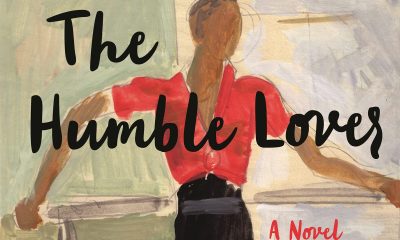News
Christian Union perpetuates culture of homophobia at elite universities
Matt Bennet founded organization in 2002

The Christian Union was founded in 2002 by CEO Matt Bennet to fight what he saw as the secularization of top universities and to raise up a generation of global leaders with Christian values. Since it established its first ministry program at Princeton University in 2002, Christian Union has established chapters at all eight Ivy League Schools, as well as at Stanford University and Harvard Law School.
To most onlookers, the Christian Union appears to be a relatively benign presence on these campuses.
Christian Union’s Dartmouth College chapter, for example, until the middle of last year made waffles late on Friday nights to give to students walking home from Frat Row, and these “Christian waffles” made the group somewhat of a hit among the college’s partying community. Dartmouth Christian Waffles, which now operates independently of Christian Union, now makes the waffles.
Behind the Christian Union’s friendly aesthetic and glossy promotional materials, however, there is a sinister and well documented history of homophobia, and queer student members have felt the consequences of the organization’s fundamentalist approach to sex and sexuality.
In the wake of the 2015 U.S. Supreme Court decision legalizing same-sex marriage, the Christian Union Magazine published an article titled “After Obergefell: What Can the Church do?”, describing the ruling as “egregious” and calling on the church to reach out to “those with same-sex attraction and gender identity confusion” and help them form a “Biblical view of themselves.” Under all of the coded religious language, this means, at worst, praying the gay away, and at best, celibacy.
On July 21, 2016, the Christian Union Magazine published an article titled “Christianity Can’t Be Stretched to Endorse Homosexuality,” directly in the wake of the Pulse nightclub massacre in Orlando, Fla. Instead of mourning this instance of extreme violence against the LGBTQ community, the article launched into a defense of the organization’s non-affirming theology, arguing that a true Christian could never accept “gay sexual practices” while remaining faithful to the Bible.
This article is one of many on the topic of what the Christian Union calls “same-sex attraction” — even that phrase robs queer people of humanity and minimizes what it means to be gay — and all are available on Christian Union’s website for the world to see. However, the Christian Union is first and foremost an organization that engages with college students, and to understand the human impact of their fundamentalist theology, the Washington Blade reached out to several current and former Christian Union members about their experiences with the group.
Darby Aono, who graduated from Yale University in 2017, became involved in Yale Christian Union at the end of her freshman year. She was invited to the group by a friend from her dorm, and Aono’s interactions with the first ministry fellow she met were overwhelmingly positive. She continued to get involved with Christian Union, including joining a Bible study later that year.
“I was at Yale over the summer, and I was invited to their Bible study, so I started going to that. There were definitely suspicious things — not about queer stuff, yet — but at that time they did not have women in leadership roles, and it was understood that were would not be,” Aono said.
Valentina Fernandez is a current sophomore at Dartmouth College, and she shared that her experience with Christian Union at Dartmouth has been generally positive. But, similarly to Aono’s initial experience at Yale, Dartmouth’s chapter had an off-putting approach to gender.
Fernandez shared that everyone in the group was very welcoming during her first year, and as someone who was raised Christian but wasn’t very knowledgeable about traditions or the Bible, she was mostly there to find community.
“The reason why a lot of [sophomores], particularly girls, are not as involved this year is because apparently a girl can’t be president by herself — she needs to be co-president with a guy. And a lot of us were like, what?! I wish I knew more about that,” Fernandez said.
While the Christian Union’s approach to women in leadership was concerning for both Fernandez and Aono, it was when Aono started to question her own sexuality that more contentious conversations about queer identities started to surface within Yale Christian Union.
“I think it was maybe during my sophomore year, when I was like, oh, like, maybe I’m not straight. And so I would sometimes talk to my friend in my dorm who was in Christian Union, who originally invited me, and we would get into arguments about homosexuality,” Aono said.
“The party line of Christian Union at that time was ‘love the sinner, hate the sin,’ where we all sin, so we aren’t going to excommunicate anyone for feeling same sex attraction, but just don’t act on it. Don’t sin. I would say that was generally how people seemed to feel about it.”
Then, Aono joined a Christian Union book club, where they read Wesley Hill’s book “Washed and Waiting,” in which Hill advocates for gay Christians to live celibate.
“I don’t want to speak for everyone, but I will say I personally joined the book club because I knew I was queer,” Aono said. “A large part of the discussion was about how to acknowledge the fact that you experience same-sex attraction without acting on it.”
Aono described reading Bible passages in the book club about being gay alongside other passages about being a drunkard or a thief, and feeling a sense of deep incongruity between the two.
“I remember being in the book club and being like: Being gay just is categorically different than stealing. I don’t understand why those two things are listed together,” Aono said.
However, one of the most pivotal conversations about being queer during Aono’s time with the Christian Union happened in the wake of the Obergefell ruling. After seeing the articles Christian Union was publishing about homosexuality after the ruling, Aono reached out to Christian Union via email, asking them to stop spreading incorrect and harmful messages. This email is what got her a meeting with Chris Matthews, the ministry director of Yale Christian Union at the time.
“Somehow, the ministry director figured out that I had sent this email. And so eventually we ended up deciding to have a meeting. At first, we were just arguing about whether you could change the fact that you were gay. At some point, I basically came out to him as queer,” Aono recalled. “And he said, ‘I understand how you’re feeling, because when I was a teenager, I used to have sexual feelings towards office supplies, but I grew out of that.’ I didn’t even know what to say in response to that. I didn’t fight him, because I think I was too shellshocked.”
“I remember walking out of there and then having to go to a ‘welcome the freshmen to Christian Union’ event. And I was like, I don’t know how I’m supposed to go welcome some fucking freshmen after this,” Aono said.
While comparing being queer to being attracted to office supplies is a truly unique instance, moments of casual — and non-casual — homophobia are all too common in the Christian Union. This doesn’t mean that students don’t find meaningful community in the group, or that all of its members are non-affirming of queer people, but the organization itself has a long track record of unsupportive and sometimes outright discriminatory practices.
Harvard University’s chapter of Christian Union, called Harvard College Faith and Action, ignited controversy in 2018 for forcing a student leader to step down after finding out that she was in a celibate same-sex relationship. This led to HCFA being put on probation for violating the university’s anti-discrimination policies for student organizations, only to be re-recognized a year later, despite failing to disaffiliate from Christian Union as the college had required.
A recent Harvard graduate and former member of HCFA, who asked to remain anonymous due to privacy concerns, recalled being caught off guard by how non-affirming the organization was.
“I became interested in HCFA because of some racial justice work that they were doing,” they said. “I didn’t expect them to be fully affirming. I didn’t realize quite how bad it would be.”
A few months after HCFA pressured the student leader to step down for being in a same sex relationship, they again stirred controversy by inviting writer and self-identifying former lesbian Jackie Hill-Perry to Harvard to speak with Christian Union in February 2018. While HCFA characterized this as an “internal” event, Hill-Perry’s presence on campus drew attention, and protesters bearing rainbow flags showed up to the event.
Princeton University’s chapter of Christian Union had also hosted Jackie Hill-Perry in February 2017, so the practice of Christian Union paying a self-identified “speaker to preach on the sins of homosexuality was nothing new.”
The recent Harvard graduate, who attended Hill-Perry’s Harvard speech, recalled the event and HCFA’s efforts to re-characterize it as an internal, scriptural conversation instead of an anti-gay public forum.
“It was very much spun as, she’s going to talk about Jesus in the Garden of Gethsemane before he decided to sacrifice himself,” the graduate said. “The HCFA kept pushing the idea that this was going to be about this particular Bible story, which is a very important Bible story amongst Christians. Now, she did preach on that — and there was no program given before — but she very much preached on the immorality of same-sex relationships and how you can overcome same-sex attraction.”
Unlike Aono, who ended up talking with Yale Christian Union leadership about her concerns, the anonymous Harvard graduate recalled generally being ignored by HCFA leadership.
“I never got any meeting with any leadership. No one was pulling me into their office — I think they were just hoping I’d shut up,” they said.
Like this former Harvard student, the Blade also had trouble getting a meeting with Christian Union leadership. Almost everyone to whom the Blade reached out to for this article declined to comment.
Don Weiss and Noah Crane, ministry directors at Harvard and Dartmouth, respectively, both declined requests for an interview. Multiple Dartmouth students who are or were Christian Union student leaders, and neither the communications staff of Christian Union nor Tyler Parker ever responded to multiple requests for comment.
“I imagine a lot of people don’t want to talk to you because they were so incredibly damaged. I have no regrets — I’m glad that I brought this up because I have no idea if other people would have,” said the Harvard graduate. “I’m glad that people know that HCFA can be so harmful.”
District of Columbia
D.C. police arrest man for burglary at gay bar Spark Social House
Suspect ID’d from images captured by Spark Social House security cameras

D.C. police on Feb. 18 arrested a 63-year-old man “of no fixed address” for allegedly stealing cash from the registers at the gay bar Spark Social House after unlawfully entering the bar at 2009 14th St., N.W., around 12:04 a.m. after it had closed for business, according to a police incident report.
“Later that day officers canvassing for the suspect located him nearby,” a separate police statement says. “63-year-old Tony Jones of no fixed address was arrested and charged with Burglary II,” the statement says.
The police incident report states that the bar’s owner, Nick Tsusaki, told police investigators that the bar’s security cameras captured the image of a man who has frequently visited the bar and was believed to be homeless.
“Once inside, the defendant was observed via the establishment’s security cameras opening the cash register, removing U.S. currency, and placing the currency into the left front pocket of his jacket,” the report says.
Tsusaki told the Washington Blade that he and Spark’s employees have allowed Jones to enter the bar many times since it opened last year to use the bathroom in a gesture of compassion knowing he was homeless. Tsusaki said he is not aware of Jones ever having purchased anything during his visits.
According to Tsusaki, Spark closed for business at around 10:30 p.m. on the night of the incident at which time an employee did not properly lock the front entrance door. He said no employees or customers were present when the security cameras show Jones entering Spark through the front door around 12:04 a.m.
Tsusaki said the security camera images show Jones had been inside Spark for about three hours on the night of the burglary and show him taking cash out of two cash registers. He took a total of $300, Tsusaki said.
When Tsusaki and Spark employees arrived at the bar later in the day and discovered the cash was missing from the registers they immediately called police, Tsusaki told the Blade. Knowing that Jones often hung out along the 2000 block of 14th Street where Spark is located, Tsusaki said he went outside to look for him and saw him across the street and pointed Jones out to police, who then placed him under arrest.
A police arrest affidavit filed in court states that at the time they arrested him police found the stolen cash inside the pocket of the jacket Jones was wearing. It says after taking him into police custody officers found a powdered substance in a Ziploc bag also in Jones’s possession that tested positive for cocaine, resulting in him being charged with cocaine possession in addition to the burglary charge.
D.C. Superior Court records show a judge ordered Jones held in preventive detention at a Feb. 19 presentment hearing. The judge then scheduled a preliminary hearing for the case on Feb. 20, the outcome of which couldn’t immediately be obtained.
District of Columbia
Judge rescinds order against activist in Capital Pride lawsuit
Darren Pasha accused of stalking organization staff, board members, volunteers

A D.C. Superior Court judge on Feb.18 agreed to rescind his earlier ruling declaring local gay activist Darren Pasha in default for failing to attend a virtual court hearing regarding an anti-stalking lawsuit brought against him by the Capital Pride Alliance, the group that organizes D.C.’s annual Pride events.
The Capital Pride lawsuit, initially filed on Oct. 27, 2025, accuses Pasha of engaging in a year-long “course of conduct” of “harassment, intimidation, threats, manipulation, and coercive behavior” targeting Capital Pride staff, board members, and volunteers.
In his own court filings without retaining an attorney, Pasha has strongly denied the stalking related allegations against him, saying “no credible or admissible evidence has been provided” to show he engaged in any wrongdoing.
Judge Robert D. Okum nevertheless on Feb. 6 approved a temporary stay-away order requiring Pasha to stay at least 100 feet away from Capital Pride’s staff, volunteers, and board members until the time of a follow-up court hearing scheduled for April 17. He reduced the stay-away distance from 200 yards as requested by Capital Pride.
In his two-page order issued on Feb. 18, Okun stated that Pasha explained that he was involved in a scooter accident in which he was injured and his phone was damaged, preventing him from joining the Feb. 6 court hearing.
“Therefore, the court finds there is a good cause for vacating the default,” Okun states in his order.
At the time he initially approved the default order at the Feb. 6 hearing that Pasha didn’t attend, Okun scheduled an April 17 ex parte proof hearing in which Capital Pride could have requested a ruling in its favor seeking a permanent anti-stalking order against Pasha.
In his Feb. 18 ruling rescinding the default order Okun changed the April 17 ex parte proof hearing to an initial scheduling conference hearing in which a decision on the outcome of the case is not likely to happen.
In addition, he agreed to consider Pasha’s call for a jury trial and gave Capital Pride 14 days to contest that request. The Capital Pride lawsuit initially called for a non-jury trial by judge.
One request by Pasha that Okum denied was a call for him to order Capital Pride to stop its staff or volunteers from posting information about the lawsuit on social media. Pasha has said the D.C.-based online blog called DC Homos, which Pasha claims is operated by someone associated with Capital Pride, has been posting articles portraying him in a negative light and subjecting him to highly negative publicity.
“The defendant has not set forth a sufficient basis for the court to restrict the plaintiff’s social media postings, and the court therefore will deny the defendant’s request in his social media praecipe,” Okun states in his order.
A praecipe is a formal written document requesting action by a court.
Pasha called the order a positive development in his favor. He said he plans to file another motion with more information about what he calls the unfair and defamatory reports about him related to the lawsuit by DC Homos, with a call for the judge to reverse his decision not to order Capital Pride to stop social media postings about the lawsuit.
Pasha points to a video interview on the LGBTQ Team Rayceen broadcast, a link to which he sent to the Washington Blade, in which DC Homos operator Jose Romero acknowledged his association with Capital Pride Alliance.
Capital Pride Executive Director Ryan Bos didn’t immediately respond to a message from the Blade asking whether Romero was a volunteer or employee with Capital Pride.
Pasha also said he believes the latest order has the effect of rescinding the temporary stay away order against him approved by Okun in his earlier ruling, even though Okun makes no mention of the stay away order in his latest ruling. Capital Pride attorney Nick Harrison told the Blade the stay away order “remains in full force and effect.”
Harrison said Capital Pride has no further comment on the lawsuit.
District of Columbia
Trans activists arrested outside HHS headquarters in D.C.
Protesters demonstrated directive against gender-affirming care

Authorities on Tuesday arrested 24 activists outside the U.S. Department of Health and Human Services headquarters in D.C.
The Gender Liberation Movement, a national organization that uses direct action, media engagement, and policy advocacy to defend bodily autonomy and self-determination, organized the protest in which more than 50 activists participated. Organizers said the action was a response to changes in federal policy mandated by Executive Order 14187, titled “Protecting Children from Chemical and Surgical Mutilation.”
The order directs federal agencies and programs to work toward “significantly limiting youth access to gender-affirming care nationwide,” according to KFF, a nonpartisan, nonprofit organization that provides independent, fact-based information on national health issues. The executive order also includes claims about gender-affirming care and transgender youth that critics have described as misinformation.
Members of ACT UP NY and ACT UP Pittsburgh also participated in the demonstration, which took place on the final day of the public comment period for proposed federal rules that would restrict access to gender-affirming care.
Demonstrators blocked the building’s main entrance, holding a banner reading “HANDS OFF OUR ‘MONES,” while chanting, “HHS—RFK—TRANS YOUTH ARE NO DEBATE” and “NO HATE—NO FEAR—TRANS YOUTH ARE WELCOME HERE.”
“We want trans youth and their loving families to know that we see them, we cherish them, and we won’t let these attacks go on without a fight,” said GLM co-founder Raquel Willis. “We also want all Americans to understand that Trump, RFK, and their HHS won’t stop at trying to block care for trans youth — they’re coming for trans adults, for those who need treatment from insulin to SSRIs, and all those already failed by a broken health insurance system.”
“It is shameful and intentional that this administration is pitting communities against one another by weaponizing Medicaid funding to strip care from trans youth. This has nothing to do with protecting health and everything to do with political distraction,” added GLM co-founder Eliel Cruz. “They are targeting young people to deflect from their failure to deliver for working families across the country. Instead of restricting care, we should be expanding it. Healthcare is a human right, and it must be accessible to every person — without cost or exception.”

Despite HHS’s efforts to restrict gender-affirming care for trans youth, major medical associations — including the American Medical Association, the American Academy of Pediatrics, and the Endocrine Society — continue to regard such care as evidence-based treatment. Gender-affirming care can include psychotherapy, social support, and, when clinically appropriate, puberty blockers and hormone therapy.
The protest comes amid broader shifts in access to care nationwide.
NYU Langone Health recently announced it will stop providing transition-related medical care to minors and will no longer accept new patients into its Transgender Youth Health Program following President Donald Trump’s January 2025 executive order targeting trans healthcare.




















